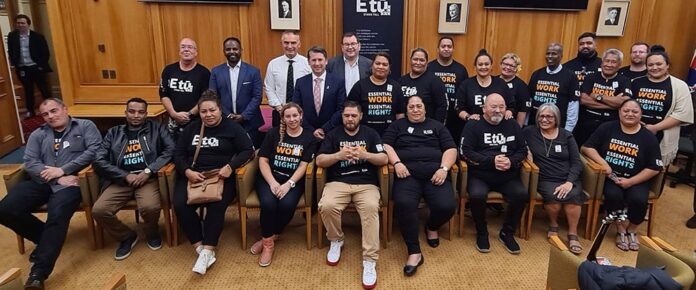Source: Etu Union
By E tū Assistant National Secretary Annie Newman, as published on Stuff on 3 June 2021: https://www.stuff.co.nz/business/prosper/300323156/why-new-zealand-needs-fair-pay-agreements
It has been 30 years since the Employment Contracts Act 1991 removed sector-wide bargaining from our industrial relations system, implementing one of the most radical individualised employment relations systems in the world.
In-work poverty simply was not a reality of New Zealand life at the time, but in the intervening 30 years it has become an albatross around this country’s neck, dragging down household incomes, local economies and national standards at work.
The recently proposed law to establish Fair Pay Agreements is about sector-wide bargaining for minimum standards that ensure decent work, where workers earn enough to live on and receive the protections that any developed country should expect for its workforce.
Sector-wide bargaining is just that – it means negotiating employment agreements that cover whole sectors and industries, whether that’s security, cleaning, home-care work or retail (those workers we have come to appreciate as our essential workforce in the age of Covid-19).
Most developed economies have some form of sector-wide bargaining and the OECD promotes the concept as benefiting workers, businesses and the wider community. This is a reversal of the position they held in the 90s, when the experiment of deregulation ran wild. It’s time now for us to catch up to the 21st century.
Closer to home, the case for sector-wide bargaining was put forward in independent research conducted by Business and Economic Research (BERL). The evidence is clear: there is no economic reason not to implement sector bargaining but many social and individual wellbeing reasons to do so.
Fair Pay Agreements will not be a return to the awards system, nor to the much-maligned compulsory unionism of yesteryear, but rather they will help us re-establish notions of decent work, where workers and their families can thrive and fully participate as active citizens in society, safe in the knowledge that stability, security, safety and liveable incomes are assured.
One problem that highlights the need for workplace transformation is the contracting model. Services like cleaning and security are delivered by businesses that contract to a third party, the “client”. The in-built competitive tendering for services drives the cost of the contract down in a race to the bottom, where the most vulnerable workers bear the cost in loss of hours, poverty wages, and inadequate health and safety practices.
Some employers report that they would much prefer to pay decent wages but cannot do so while being undermined by the “cowboys” paying the bare minimum. Fair Pay Agreements would mean services compete on the quality of the service rather than the cost of the labour.
Most unfortunately, some commentators have chosen to misrepresent Fair Pay Agreements. It is important that we set the record straight, in order to have a properly informed public conversation.
It has been suggested that only a small number of unions and employers will have a say in the negotiation of a Fair Pay Agreement.
This is categorically untrue.
Every single worker and employer will have the opportunity to be represented in negotiations and to vote on the agreement itself.
Fair Pay Agreements come into force through a majority ratification of the parties.
Only when bargaining is protracted and ratification fails twice, or because the parties choose to, is there a determination through the Employment Relations Authority.
To suggest that a much-improved system for workplace democracy is somehow unfair is quite disingenuous.
Some argue that Fair Pay Agreements would add an extra layer of complexity for affected employers. In fact, the status quo, which sees most workers on individual employment agreements, is far more complex.
By collectivising and centralising the bargaining process, employers can simply apply the terms and conditions set in the Fair Pay Agreement, knowing they are meeting the market standard.
It is time we normalise decent work and discourage arguments that anyone – the worker, the business or the economy – benefits from exploitation and poverty. We all lose. The current pandemic has exposed how interconnected all our lives are in this small country.
Fair Pay Agreements are just a mechanism to normalise decent behaviour at work, things like the Living Wage, protection against unsafe practices, 10 days of sick leave and the right skills to do the job. Who can argue for less?
Nelson Mandela said: “Overcoming poverty is not a gesture of charity. It is an act of justice. It is the protection of a fundamental human right, the right to dignity and a decent life.” Let’s normalise a decent life with Fair Pay Agreements.
The Government is expected to take Fair Pay Agreement legislation to Parliament before the end of the year.
We must be on the lookout for bad faith arguments and ensure that our collective will to improve our working lives is the winner on the day.



